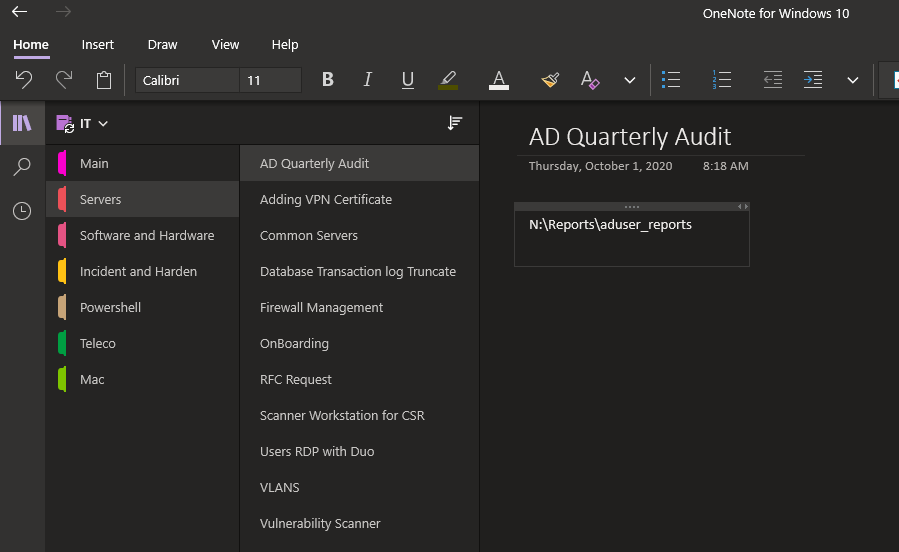
Starting out in IT Infrastructure Operations
Are you interested in a career in IT Operations? Getting started in the IT field may seem daunting, but there are some simple steps that can set you on the right path. This tutorial will cover the basics on how to begin your IT journey.
Knowledge

In the ever evolving world of IT, knowledge is power. Even for someone who has worked in IT for years, there are always new challenges to face. Arming yourself with knowledge is essential to navigating new technologies and the challenges they bring.
An excellent Helpdesk Administrator is constantly learning. Rather than just doing what is required, I suggest that you aim to become a Subject Matter Expert in every system. This is crucial to earning the trust of your users and being a great team member. If an Administrator doesn’t have the trust of their users, their workload may fall on their teammates and lessen everyone’s productivity and morale.
I have seen users call the Helpdesk line and immediately hang up upon being connected with a certain Administrator. This can be avoided by learning all of the systems in your workplace and speaking up when you need help. If your colleagues and managers are unable to assist, consider reaching out to another department that actively uses that software. By taking advantage of all of your resources, you can become familiar with the challenges your users face, including those that they may not report because they lack faith that they’ll be helped.
Taking advantage of my resources and building connections was an invaluable step in spearheading a project that overhauled an entire department’s workflow to increase productivity. Becoming familiar with the needs of other departments and the business overall can also be a valuable way to gain experience in Project Management.
Interpersonal Skills

There is a common trope in pop culture that IT technicians lack social skills. On the contrary, Customer Service and effective communication are among the most important skills for an Administrator to possess. I have spent years in Customer Service both in and out of the IT field, and can firmly say that people skills are just as important as technical experience. Whether you’re assisting employees in your workplace or working with external companies like Managed Service Providers, you will spend a significant portion of your time talking to people.
As you progress to more senior roles or transition from Helpdesk to other positions such as System Administration, Network Operations Center, or Security Operations Center, you will continue to communicate with others daily. It is imperative to always remain patient, kind, and friendly. Going above and beyond to help both users and colleagues is a key element in your personal success, and in your company recognizing you as an asset.
Documentation

Since IT is constantly changing, creating and organizing documentation is essential in keeping your skills and knowledge up to date. I personally recommend Microsoft OneNote, which I have used to create and store documents across multiple positions and workplaces. OneNote is user friendly and syncs data to the Microsoft cloud, keeping your documents safe in the event of a computer issue.
Some example documents that I recommend storing and organizing are:
- Processes for New Hires, Terminations, VPN, etc.
- Tutorials for yourself and your users
- Powershell/Command line commands that you use regularly
- Tribal knowledge unique to your company and work environment
Documenting and periodically reviewing this information will ensure that you remain knowledgable and avoid having to ask the same question multiple times. This will improve your performance at work and help you gain the trust of your users.
Note: Microsoft OneNote is not suitable for secure data such as passwords
Processes

Every company has its own way of doing things. Some of the companies I have worked for were required to be PCI Compliant, which means that every environment change needs approval. Make sure that you pay close attention to your company requirements, and from whom you need approval for various processes. In some cases, especially those involving sensitive data, you may need approval from multiple people. This may seem simple, but I have seen many Administrators get in trouble by trying to bypass the correct procedures.
If the environment is required to be PCI Compliant, keep in mind that you will likely need approval for everything beyond basic troubleshooting and repair. Be sure to keep yourself up to date and proficient at operating ticketing services such as Service Now, Spiceworks, Zendesk, or Track It Technician.
By staying mindful of the above skills, you’ll begin your IT journey feeling confident and prepared for the challenges (and rewards!) ahead. Good luck on your path, and remember to always be open to new knowledge and experiences!
-Sammah